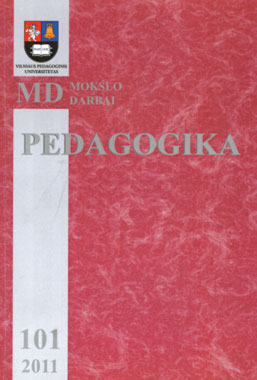Radikalaus pliuralizmo principų raiška į vaiką orientuotame ugdyme
Development of radical pluralism principles within education centered towards a child
Author(s): Audronė JuodaitytėSubject(s): Education
Published by: Vytauto Didžiojo Universitetas
Keywords: pluralism; radical pluralism; anti pedagogy; child’s freedom; child’s individualism, and unique being.
Summary/Abstract: Pluralism within modern pedagogy may be understood as a positive phenomenon as its absence has created “childless” pedagogy and nonargument truth’s monopoly that leads teacher to the realization of his / her algorithmic thinking and acting. Democratic movements for human rights and freedoms have raised new problems to a pedagogy and child’s education, and also to the understanding that children being as different socio-cultural individuals should be taught within different environments as well. This only brings the cultural variety into pedagogy and the practice of children’s education, and simultaneously helps to shape cultural education, which could be identified as respectful to a child’s cultural individualism. Pedagogy of radical pluralism creates new answers into such questions as: what does it mean for a child to be different? How does a child feel when someone says “Be better than the others!”? In this case individualism is not created as a child seeks to be the same as others are. Thus it is very important for educators to grasp the idea that every child is different (culturally, socially, age wise etc.), i.e. there is no ideal child within education process – everyone is unique and different. Radical pluralism can change educators’ attitudes not only towards children learning process but also – their expression possibilities as teacher only gives examples and directions for those expressions to come true. Radical pluralism is a philosophical stream that came out from different concepts of living and learning (education) that become a socio-cultural virtue to a modern teacher. Pluralism in pedagogy – is a conscious challenge against traditionalism that has appeared after teacher-child relations hierarchy took main part in education, when child’s individualism was rejected and equal rights to learn were abandoned.
Journal: Pedagogika
- Issue Year: 2011
- Issue No: 101
- Page Range: 50-56
- Page Count: 7
- Language: Lithuanian

